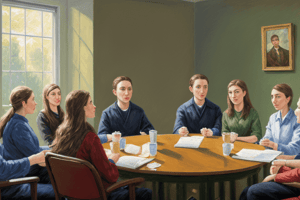Podcast
Questions and Answers
Match the following types of group counseling with their primary focus:
Match the following types of group counseling with their primary focus:
Task-oriented groups = Achieving specific goals or tasks Psychoeducational groups = Educating members about a specific topic Support groups = Providing emotional support and connection Cognitive-behavioral groups = Changing negative thought patterns
Match the following benefits of group counseling with their descriptions:
Match the following benefits of group counseling with their descriptions:
Social support = Receiving support and encouragement from others Diverse perspectives = Gaining insight from others with different backgrounds Cost-effective = A more affordable option compared to individual counseling Improved communication skills = Developing communication and social skills
Match the following steps in the group counseling process with their descriptions:
Match the following steps in the group counseling process with their descriptions:
Initial session = Introduction, goal-setting, and establishing group rules Group dynamics = Members interacting, sharing, and learning from each other Counselor role = Facilitating group discussion and providing guidance Termination = Reviewing progress and preparing for future growth
Match the following group counseling techniques with their descriptions:
Match the following group counseling techniques with their descriptions:
Match the following types of group counseling with their primary goals:
Match the following types of group counseling with their primary goals:
Match the following aspects of group counseling with their benefits:
Match the following aspects of group counseling with their benefits:
Pasangkan peran pemimpin kelompok dengan deskripsinya:
Pasangkan peran pemimpin kelompok dengan deskripsinya:
Pasangkan manfaat group counseling dengan deskripsinya:
Pasangkan manfaat group counseling dengan deskripsinya:
Pasangkan tahapan proses konseling kelompok dengan deskripsinya:
Pasangkan tahapan proses konseling kelompok dengan deskripsinya:
Pasangkan jenis konseling kelompok dengan fokus utamanya:
Pasangkan jenis konseling kelompok dengan fokus utamanya:
Pasangkan aspek konseling kelompok dengan manfaatnya:
Pasangkan aspek konseling kelompok dengan manfaatnya:
Pasangkan peran pemimpin kelompok dengan deskripsinya:
Pasangkan peran pemimpin kelompok dengan deskripsinya:
Flashcards are hidden until you start studying
Study Notes
Group Counseling
Definition
- A type of counseling that involves a small group of individuals with similar concerns or issues, guided by a trained counselor or therapist
- Goal: to promote personal growth, self-awareness, and social skills through group interaction and collaboration
Types of Group Counseling
- Task-oriented groups: focus on achieving specific goals or tasks, such as skill-building or problem-solving
- Psychoeducational groups: focus on educating members about a specific topic or issue, such as mental health or relationships
- Support groups: focus on providing emotional support and connection among members who share a common experience or issue
- Cognitive-behavioral groups: focus on identifying and changing negative thought patterns and behaviors
Benefits of Group Counseling
- Social support: members receive support and encouragement from others who understand their experiences
- Diverse perspectives: members gain insight from others with different backgrounds and experiences
- Cost-effective: group counseling can be a more affordable option compared to individual counseling
- Improved communication skills: members develop communication and social skills through group interaction
Group Counseling Process
- Initial session: introduction, goal-setting, and establishment of group rules
- Group dynamics: members interact, share, and learn from each other
- Counselor role: facilitates group discussion, provides guidance, and ensures a safe environment
- Termination: final session, review of progress, and preparation for future growth
Group Counseling Techniques
- Active listening: members practice attentive listening to promote understanding and empathy
- Role-playing: members practice new skills or behaviors in a simulated environment
- Feedback: members provide constructive feedback to each other to promote growth and understanding
- Reflection: members reflect on their experiences and progress to identify areas for improvement
Studying That Suits You
Use AI to generate personalized quizzes and flashcards to suit your learning preferences.




